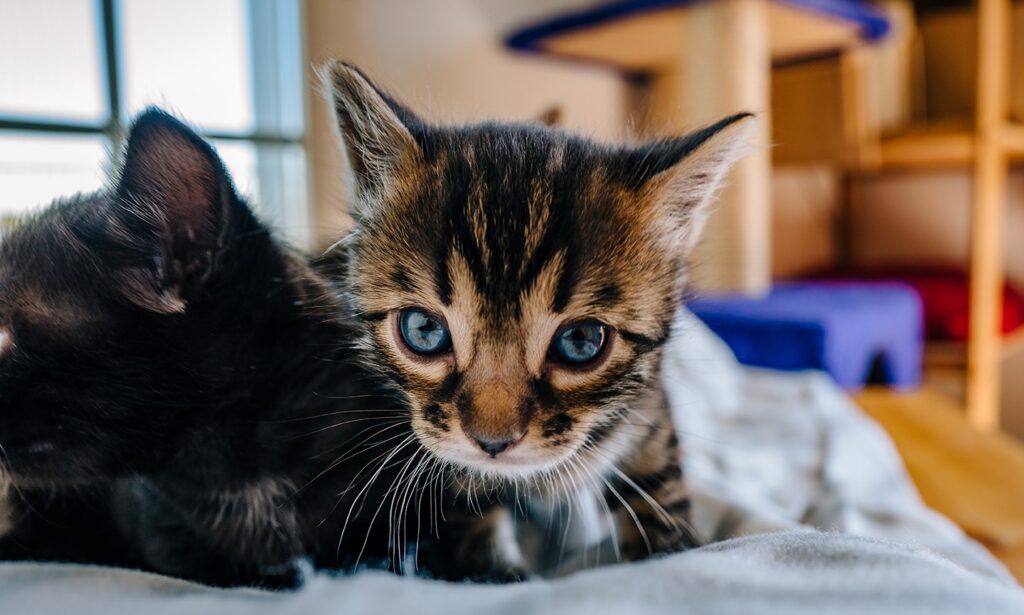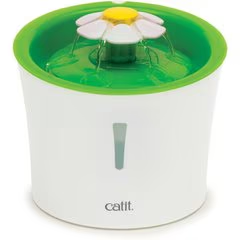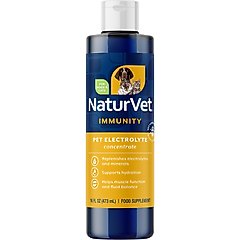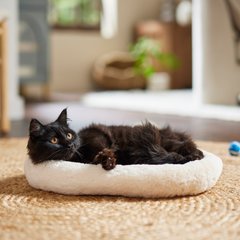Is Your Kitten Throwing Up? Possible Causes and Treatment

Photo by maggiolino/iStock/Getty Images Plus via Getty Images
Welcoming a new kitten into your home is exciting, but that joy can swiftly turn into worry if your furry little friend begins to throw up. As with adult cats, a kitten throwing up can be due to something relatively harmless, like a hairball, or something more serious, like intestinal parasites or ingestion of a foreign object.
We spoke with vet experts to understand the possible reasons a kitten could be throwing up and what to do if you find yourself facing this messy conundrum.
Help, My Kitten’s Throwing Up
What Does Throwing Up Entail?
First things first, it’s important to understand what “throwing up” actually means. Let’s break down the difference between vomiting and regurgitation.
Vomiting
“Vomiting is an active process that involves forceful contraction of the abdominal muscles,” says Dr. Doug Mader, MSc, DVM, volunteer veterinarian at U.S. Fish and Wildlife Service in the Florida Keys and author of “The Vet at Noah’s Ark.”
Food is expelled from the cat’s stomach or the upper small intestine, and stomach acid is generally present.
This can happen while eating, soon after eating or hours later, and usually involves the cat grunting, retching or heaving, Dr. Mader adds.
Regurgitation
Another process that looks similar to vomiting is regurgitation.
“This is a passive process that does not involve the contraction of any muscles,” says Dr. Mader. “The head is lowered, and food is expelled from the mouth, pharynx and esophagus.”
This usually occurs while eating or immediately afterward and does not involve grunting, retching or heaving.
Collectively, vomiting and regurgitation are commonly referred to as “throwing up,” and there are many potential causes for both.
Why Is My Kitten Throwing Up?
If you notice your kitten throwing up, it’s important to figure out why. Here are the most common reasons for vomiting in kittens, according to Dr. Mader.
- Eating habits: Eating too much, eating too fast or changing food abruptly can lead to vomiting.
- Hairballs: Cats are meticulous groomers and can swallow a lot of hair, which may form hairballs and cause vomiting.
- Intestinal parasites: Common in kittens, parasites such as roundworms or tapeworms can lead to vomiting.
- Intestinal infections: Infections caused by bacteria, viruses or fungi can disrupt the digestive system, resulting in vomiting.
- Internal organ disease: Diseases affecting internal organs, like the kidneys, liver, pancreas or thyroid, can have vomiting as a symptom.
- Food allergies: Like humans, kittens can be allergic to certain types of food, which can cause vomiting.
- Toxin ingestion: Ingesting toxic substances such as poisonous plants or chemicals can lead to vomiting.
- Foreign body ingestion: Swallowing foreign objects, like string, yarn or plastic, can cause an intestinal obstruction or intestinal blockage, leading to vomiting.
- Heatstroke: Prolonged exposure to excessive heat can cause heat stroke, when a cat’s body temperature becomes dangerously high (104 degrees Fahrenheit or higher). One symptom of this condition is vomiting.
What To Do if Your Kitten Is Throwing Up
Kitten With Diarrhea and Vomiting
A kitten who is vomiting and has diarrhea likely has a systemic illness, says Dr. Mader.
“Heavy intestinal parasites, viral infections and bacterial enteritis are all possible causes, especially in kittens,” he says.
Changes in stress levels can sometimes also cause vomiting episodes and loose stool, adds Dr. Elizabeth Moses, DVM, veterinarian at Veterinary Emergency Group in South Tampa, FL.
“But this should be short-lived and resolve as stress levels and diet normalize,” she adds.
Vomiting and diarrhea can lead to electrolyte loss, dehydration and even death if not promptly treated, says Dr. Mader.
What to do
Take your kitten to your veterinarian or a pet emergency clinic if these symptoms last for more than 24 hours.
Kitten Throwing Up White Foam
Throwing up white foam is common when a cat vomits on an empty stomach, says Dr. Mader.
“There is always a small amount of fluid and mucus in the stomach, even between meals,” he adds.
This fluid mix includes a digestive enzyme known as pepsin. When a cat heaves on an empty stomach, the pepsin combines with the gastric fluids, creating the white, foamy substance, explains Dr. Mader. This symptom can be attributed to various factors, such as inflammation or irritation of the stomach or intestines, as well as any of the causes of vomiting mentioned previously.
What to do
Monitor your kitten for a day. If vomiting persists for more than a day, seek veterinary care.
Kitten Throwing Up Clear Liquid
“Clear liquid is generally water mixed with a small amount of normal digestive juices,” says Dr. Mader.
The most common cause of throwing up clear liquid is drinking too fast, drinking water that may be too hot or cold or drinking water that may contain something irritating to the stomach (like chlorine in pond or pool water), he adds.
What to do
Keep an eye on your kitten’s behavior for the next day.
If vomiting continues for more than a day, contact your veterinarian.
Kitten Throwing Up Yellow Liquid
A yellow tint in vomit is due to bile, a digestive fluid produced by the liver and stored in the gallbladder, says Dr. Mader.
When a cat’s stomach is empty, certain conditions that irritate the intestinal tract can cause bile to travel from the duodenum—which is located at the beginning of the small intestine—back up into the stomach. There, the bile mixes with the stomach’s natural juices. The result is a yellow-colored vomit, which may appear clear or be mixed with white foam.
What to do
If yellow vomiting persists for more than a day, seek veterinary attention.
Kitten Throwing Up Food
“Intestinal parasites are the most common cause for a kitten to vomit all of their food at once,” says Dr. Mader. “Ingested foreign bodies such as plastic, string, yarn, etc., can also cause a kitten to profusely vomit.”
If a cat eats too fast or too soon after vigorous play time, they may also vomit or regurgitate their meal, he adds. In this case, you’ll likely notice undigested food in the vomit.
What to do
If vomiting persists after meals, bring your kitten in for a checkup.
Vomiting Kitten Treatment
A single episode of vomiting is not concerning. However, according to Dr. Moses, you should bring your kitten to your veterinarian or an emergency clinic if:
- Vomiting happens repeatedly
- Vomiting doesn’t stop after 24 hours
- Your kitten is lethargic and not interested in playing like normal
- Your kitten’s abdomen appears bloated or painful
- Your kitten is experiencing weight loss
- Your kitten vomits blood
A vet will conduct a thorough physical examination to look for signs of illness or disease. Based on that exam, a few different tests may be recommended to determine the underlying condition.
According to Dr. Moses, the most common tests include:
- A fecal test to check for parasites
- Blood work to assess hydration and electrolyte levels
- X-rays to assess for foreign material in the gastrointestinal tract or other health issues
- Other more specialized tests to rule out viral infections
The treatment for vomiting depends on the underlying cause:
- Dietary causes: If the vomiting is due to dietary indiscretion or a sudden change in diet, the veterinarian may recommend a bland diet and gradual reintroduction of normal food.
- Infections: For vomiting caused by infections or diseases, the vet may prescribe medications such as antibiotics, antivirals or antifungals, depending on the specific cause.
- Parasites: If parasites are the culprit, deworming medications will be administered to eradicate the infestation.
- Foreign objects or toxins: In cases where the vomiting is a result of the kitten ingesting a foreign object or toxic substance, hospitalization may be required. The vet might need to perform surgery to remove the object or administer specific treatments to counteract the toxin.
- Internal organ disease: For vomiting caused by internal organ diseases, such as liver disease, kidney disease, pancreatitis, inflammatory bowel disease or hyperthyroidism, the treatment will vary depending on the severity of the disease. It could range from medications to manage the symptoms, to more intensive treatments such as IV fluids or surgery.
- Heatstroke: If you suspect your kitten has heat stroke, move them to a cooler area and bring them to a vet immediately. Treatment may be needed to rehydrate your cat, regulate their body temperature and attempt to reverse any internal damage that occurred.
In some cases, supportive care such as fluid therapy and anti-nausea medications may be given to help manage symptoms while the underlying cause is being treated.
Are There Kitten Vomiting Home Remedies?
While it might be tempting to turn to home remedies when your kitten is vomiting, you should always consult with a veterinarian before attempting any at-home treatments, as improper care can potentially worsen your kitten’s condition or be fatal. That being said, the following supportive measures might be helpful in certain situations.
Hydration
Vomiting can lead to a significant loss of fluids, so maintaining your kitten’s hydration levels is crucial.
Keep your kitten’s water bowl fresh and full. A cat water fountain, like the Catit Flower Plastic Cat Fountain, may help entice them to drink more.
With approval of a vet, you can also offer them a cat-safe electrolyte solution, such as NaturVet Electrolytes Concentrate, to help replenish lost fluids and maintain electrolyte balance.
Recommended Products
Comfort and Rest
Provide a comfortable, quiet environment for your kitten to rest and recover. A calm setting can help minimize stress, which is known to exacerbate gastrointestinal issues. A cozy bed, such as the Frisco Self Warming Bolster Round Kitten Bed, would be a welcome sight to a kitten who’s feeling a bit under the weather.
Recommended Products
Changing Food
If your kitten is otherwise healthy, ask your veterinarian if you should withhold food (food only, not water) for 12 hours. This may give your kitten’s stomach a chance to settle. After 12 hours of withholding food, gradually reintroduce a bland diet.
One good option is a mixture of equal parts cooked turkey (boiled and drained of fat) and canned pure pumpkin, like Nummy Tum-Tum’s organic pumpkin canned food.
For some cases of vomiting, it may be necessary to modify your kitten’s diet permanently. You may need to give your kitten special cat food that avoids certain ingredients. Special foods may serve to add fiber, decrease fat intake and increase digestibility.
How To Prevent Your Kitten From Vomiting
While many of the factors that cause vomiting in kittens are out of your control, there are proactive steps you can take to minimize the risk of developing a condition that results in vomiting. These include:
- Regular veterinary checkups: Routine veterinary examinations are crucial in monitoring your kitten’s health, preventing parasites and catching any potential issues early.
- Proper diet and feeding practices: Feed your kitten a balanced and age-appropriate diet on a regular schedule. Avoid sudden changes in their food and always introduce new foods gradually. Follow feeding guidelines and monitor portion sizes to prevent over- or under-eating.
- Proper hydration: Ensure your kitten has access to clean, fresh water at all times.
- Safe play and environment: Keep small objects and potentially harmful items, like paper clips and string, away from your kitten to prevent ingestion of foreign bodies.
- Control hairballs: Consider giving your kitten a hairball remedy, like Hartz Hairball Remedy Plus Paste, to help prevent hairball formation.
- Avoid high heat: On hot days, try to keep your house cool by running the air conditioner or closing the blinds on your windows.
When it comes to cat health, what might seem like a simple upset stomach can sometimes be a sign of more serious conditions. Understanding the potential causes of vomiting in kittens and appropriate action to take can empower you to provide the best care for your feline friend.
For more information on raising a happy, healthy kitten who will grow into a thriving, healthy cat, explore our articles on how to handle teething, litter box training and vaccinations.







